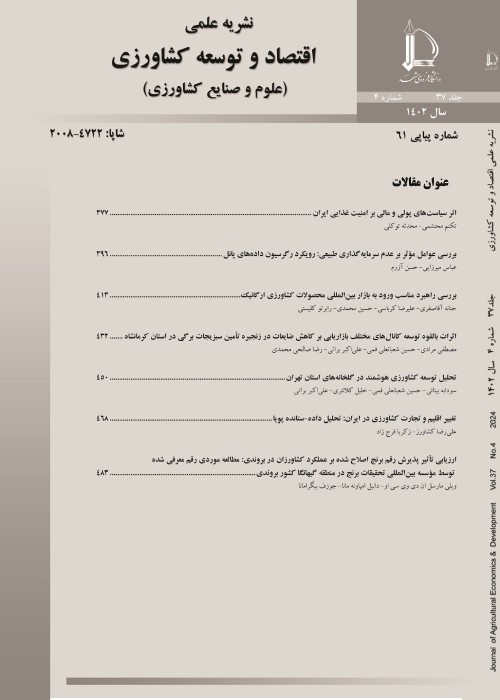Structural-interpretative Patterns of Factors Affecting the Sustainable Development of Agricultural Production Cooperatives (Case Study: East Azerbaijan Province)
cooperatives play a pivot role in creating sustained society. The objective of cooperative movement in developing countries is not only to renew old economical methods, but also to create fair economic and social conditions. For example, in the agriculture sector of most of these countries, small and even moderate agricultural units do not have acceptable productivity and efficiency and are not able to have production with reasonable prices. Therefore, one of the most effective ways for reaching to a successful agriculture development pattern and finally realizing the large-scale objectives of development is to organize people in groups known as “agricultural production cooperatives (APCs)”. Hereby, economic growth, production increase and fair distribution of incomes can be achieved by practical cooperation of rural population in various civil and social activities. Indeed, these cooperatives pave the way for boosting the production and fair distribution of interests by providing a favorable ground for institutionalizing the cooperation of rural population. All the cooperatives do not act in the same way even if they are located in the same country and are governed by the same laws. Studies showed that successful Iranian cooperatives have longer organizational history and more members, grant greater credits and inputs to their individual members, earn greater income, get more benefits, and incorporate more small scale farmers.
in this study, Questionnaire has been used for information collection. The questionnaire is validated after some revisions following consulting with professionals and experts. The reliability of the questionnaire is confirmed by Cronbach's Alpha (α = 0.971) and its validity is confirmed by professional and experts view. Finally, an interpretative equation (ISM) is used to analyze the results of the findings and presenting a sustainable development model for agricultural production cooperatives. ISM is an interactive learning process. In this technique, a set of different directly and indirectly related elements are structured into a comprehensive systematic model. The so formed model portrays the structure of a complex issue or problem in a carefully designed pattern implying graphics as well as words. In other words, interpretive structural modeling (ISM) is a well-established methodology for identifying relationships among specific items, which define a problem or an issue8. For any complex problem under consideration, a number of factors may be related to an issue or problem. However, the direct and indirect relationships between the factors describe the situation far more accurate than the individual factor taken into isolation. Therefore, ISM develops insights into collective understandings of these relationships.
Based on the findings and factors affecting development of cooperatives (economic, social-cultural, environmental, legal, educational, managerial, marketing, infrastructure, individual and cluster characteristics), variables are classified in 5 different levels and according to relationships, the ISM chart is drawn. After analyzing the MICMAC, the variables are divided into three groups: intrusive, independent and dependent variables. Since the definition of relationships between variables and types of variables can lead to better understanding of the subject and appropriate decision, it is recommended to managers of agricultural production cooperatives to pay attention to each component in order to create sustainable cooperatives.
Based on the findings from theoretical literature and interviews with managers and experts of cooperatives, components that affect sustainable development of agricultural production cooperatives are identified. Then, by using expert opinion and structural-interpretation equation approach, 10 components as the main objectives for sustainable development of agricultural production cooperatives are selected. The results of the analysis show that economic, social-cultural, environmental, legal, educational, managerial, marketing, institutional-infrastructural, personality-individual and clustering factors are effective on sustainable development of agricultural cooperatives. Also, it is important to specify the exact relationship between variables and their ranking in order to provide a model for sustainable development of agricultural production cooperatives. In this regard, structural-interpretive equations have been used. The results show that economic, socio-cultural, environmental and infrastructure-institutional factors are classified as intrusive variables. Legal factors and clustering cooperatives are classified as independent variables. Finally, marketing, educational, managerial, and individual factors are classified as dependent variables. According to the results, economic, institutional- infrastructural, and environmental factors are among most basic factors in the sustainable development of agricultural production cooperatives in East Azerbaijan province. Therefore, it is suggested that strategic action be taken to improve the status quo.
- حق عضویت دریافتی صرف حمایت از نشریات عضو و نگهداری، تکمیل و توسعه مگیران میشود.
- پرداخت حق اشتراک و دانلود مقالات اجازه بازنشر آن در سایر رسانههای چاپی و دیجیتال را به کاربر نمیدهد.



